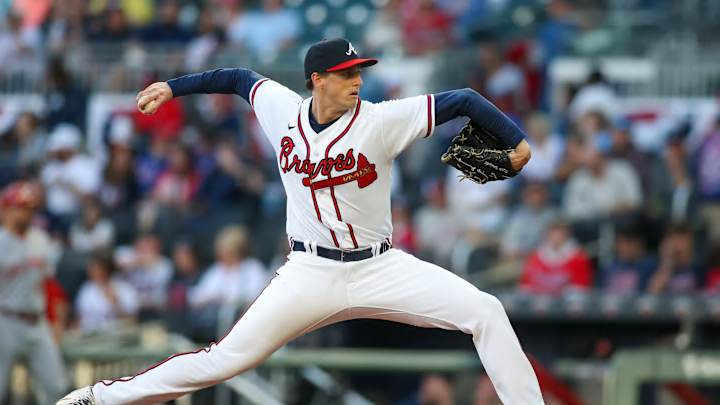Well that didn’t take long. General manager J.J. Picollo and the KC Royals are already flipping pitchers for pitchers. On Nov. 17, the Royals traded pitcher Jackson Kowar to the Atlanta Braves for starting pitcher Kyle Wright. Let's take a look at this move.
What did the KC Royals give up in Jackson Kowar?
Kowar was the 33rd pick in the Royals 2018 class. Although he was able to develop into a decent strikeout pitcher during his tenure with the organization, he struggled with location, resulting in poor metrics in walks per nine innings (BB/9), pitches per innings pitched (P/IP), ERA, and WHIP.
He also struggled with line drive rates, allowing too many hits to reach Kauffman Stadium’s power alleys, and his career 1.82 home run per nine innings (HR/9) was certainly problematic for a team that aims to keep baseballs in the stadium and let the defense do its work.
Drafting a starting pitcher with the mindset that most will be traded well before their careers plateau or begin to decline is a smart approach for the Royals' front office. Pitchers are extremely volatile acquisitions. Injury risks are significantly higher for pitchers than position players due to the unnatural use they put on their arms. Youth development and veteran decline are hard to predict.
Picollo talked about moving on from underperforming players this offseason and shifting mindsets ahead of the 2024 season. A willingness to swap pitchers for pitchers shows the Royals might be heading in the right direction this offseason.
Kyle Wright: what Kansas City gets by trading Jackson Kowar
If you know much about Wright, your first reaction might be confusion. He just had shoulder surgery and is likely to sit out most of 2024 and might even need to be eased into 2025. His 2023 numbers were not promising. Wright appeared in nine games, with seven starts, a 6.97 ERA, and a 1.84 WHIP. However, Royals fans should be elated about this trade.
Wright’s 2022 season was stellar. He started 30 games, pitching 180 innings with an 0 .95 HR/9 and a terrific 1.16 WHIP; we recently wrote about the importance of having pitchers with good WHIPs and who can chew up innings, and Picollo has grabbed a hurler who fits the bill.
In 2022, Wright’s ground-ball rate was 55.6% and he left 78.9% of batters on base. Those are numbers that all Royals fans should be excited about.
Wright, per Brooks Baseball, relies primarily on his curve and 93 mph sinker (93mph) combo, which is unique in this era of high velocities and should age well as long as he can stay healthy. Wright does have a four-seam fastball (94mph) which features a late deceptive break and he will occasionally throw a change-up (85mph) and a slider (89mph) to induce swings and misses.
As Wright comes back from surgery, the Royals' development team should work with him to lower his velocity and focus on location. He’s got a great arsenal of ground ball-inducing pitches (curve, sinker, changeup) that should play well in Kauffman Stadium. He does not need to chase swing-and-miss to be an effective starting pitcher in Kansas City.
It'll be exciting to see where this acquisition goes, and it's good news to see the front office thinking about Kauffman Stadium in their approach to pitching. The numbers show how pitchers play in to the Royals' success in Kauffman, allowing the defense to work its magic. Overall, this move is a great start for Picollo and the front office as the offseason progresses.
